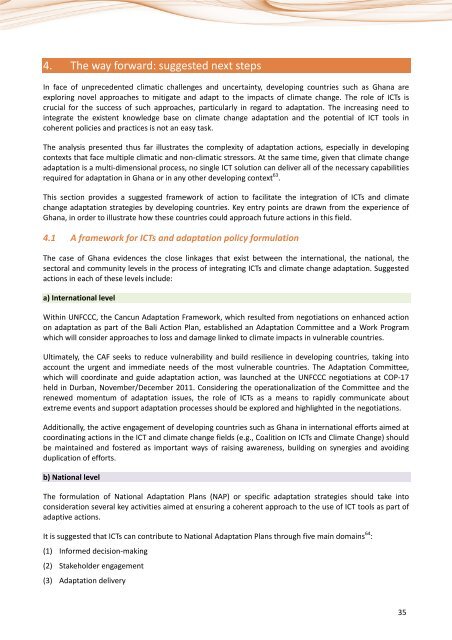Information and communication technologies (ICTs) and ... - ITU
Information and communication technologies (ICTs) and ... - ITU
Information and communication technologies (ICTs) and ... - ITU
You also want an ePaper? Increase the reach of your titles
YUMPU automatically turns print PDFs into web optimized ePapers that Google loves.
4. The way forward: suggested next steps<br />
In face of unprecedented climatic challenges <strong>and</strong> uncertainty, developing countries such as Ghana are<br />
exploring novel approaches to mitigate <strong>and</strong> adapt to the impacts of climate change. The role of <strong>ICTs</strong> is<br />
crucial for the success of such approaches, particularly in regard to adaptation. The increasing need to<br />
integrate the existent knowledge base on climate change adaptation <strong>and</strong> the potential of ICT tools in<br />
coherent policies <strong>and</strong> practices is not an easy task.<br />
The analysis presented thus far illustrates the complexity of adaptation actions, especially in developing<br />
contexts that face multiple climatic <strong>and</strong> non-climatic stressors. At the same time, given that climate change<br />
adaptation is a multi-dimensional process, no single ICT solution can deliver all of the necessary capabilities<br />
required for adaptation in Ghana or in any other developing context 63 .<br />
This section provides a suggested framework of action to facilitate the integration of <strong>ICTs</strong> <strong>and</strong> climate<br />
change adaptation strategies by developing countries. Key entry points are drawn from the experience of<br />
Ghana, in order to illustrate how these countries could approach future actions in this field.<br />
4.1 A framework for <strong>ICTs</strong> <strong>and</strong> adaptation policy formulation<br />
The case of Ghana evidences the close linkages that exist between the international, the national, the<br />
sectoral <strong>and</strong> community levels in the process of integrating <strong>ICTs</strong> <strong>and</strong> climate change adaptation. Suggested<br />
actions in each of these levels include:<br />
a) International level<br />
Within UNFCCC, the Cancun Adaptation Framework, which resulted from negotiations on enhanced action<br />
on adaptation as part of the Bali Action Plan, established an Adaptation Committee <strong>and</strong> a Work Program<br />
which will consider approaches to loss <strong>and</strong> damage linked to climate impacts in vulnerable countries.<br />
Ultimately, the CAF seeks to reduce vulnerability <strong>and</strong> build resilience in developing countries, taking into<br />
account the urgent <strong>and</strong> immediate needs of the most vulnerable countries. The Adaptation Committee,<br />
which will coordinate <strong>and</strong> guide adaptation action, was launched at the UNFCCC negotiations at COP-17<br />
held in Durban, November/December 2011. Considering the operationalization of the Committee <strong>and</strong> the<br />
renewed momentum of adaptation issues, the role of <strong>ICTs</strong> as a means to rapidly communicate about<br />
extreme events <strong>and</strong> support adaptation processes should be explored <strong>and</strong> highlighted in the negotiations.<br />
Additionally, the active engagement of developing countries such as Ghana in international efforts aimed at<br />
coordinating actions in the ICT <strong>and</strong> climate change fields (e.g., Coalition on <strong>ICTs</strong> <strong>and</strong> Climate Change) should<br />
be maintained <strong>and</strong> fostered as important ways of raising awareness, building on synergies <strong>and</strong> avoiding<br />
duplication of efforts.<br />
b) National level<br />
The formulation of National Adaptation Plans (NAP) or specific adaptation strategies should take into<br />
consideration several key activities aimed at ensuring a coherent approach to the use of ICT tools as part of<br />
adaptive actions.<br />
It is suggested that <strong>ICTs</strong> can contribute to National Adaptation Plans through five main domains 64 :<br />
(1) Informed decision-making<br />
(2) Stakeholder engagement<br />
(3) Adaptation delivery<br />
35

















